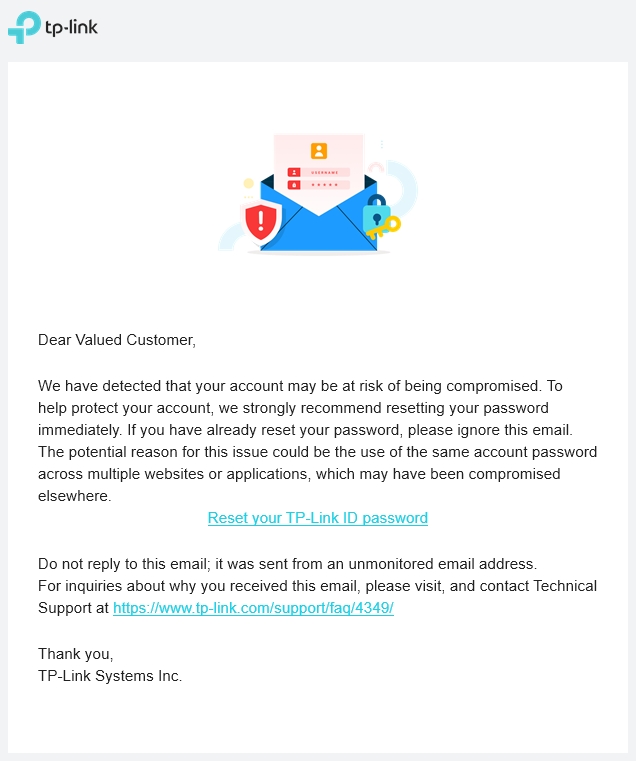Why did I receive an email titled "Potential Vulnerabilities Detected in Your Account"?
Phenomenon Description
You may receive an email with the subject "Potential Vulnerabilities Detected in Your Account" from no-reply@email.tp-link.com. The content of the email is as follows.

Q1. Why did I receive this email?
TP-Link takes user data security very seriously. If you received this email, it means:
1. You are using the same username and password combination on other websites or services as you do with your TP-Link account.
2. This combination was exposed in a data breach incident.
This does not mean that your TP-Link account has been accessed by someone else or that your data stored in the TP-Link account has been compromised. However, it does indicate that your credentials have been leaked elsewhere, posing a significant security risk. We recommend that you reset your password immediately.
Q2. How does TP-Link know my data has been compromised?
We collaborate with Google, and based on the support provided by Google, we can obtain data breach information from public databases. If your credentials appear in any data breach records, we will notify you via email.
Q3. How do I know if this email is from TP-Link or a hacker?
Please check the sender's email address. TP-Link always sends emails from no-reply@email.tp-link.com. We will never ask you to enter your login password in the email. Instead, we will only advise you to reset your password directly to ensure your account’s security.
Q4: What should I do upon receiving this email to ensure my account is secure?
We recommend that you immediately reset your password using the link below.
Reset your TP-Link ID password
When resetting a new password, consider the following suggestions.
1. Use a difficult-to-guess, unique password that is not used on other accounts.
2. Set a password that is longer than 8 characters, ideally a mix of uppercase and lowercase letters, numbers, and symbols.
3. Enable Two-Step Verification (2FA) to ensure that only trusted devices can log into your account.
Q5. What happens if I don’t take action after receiving this email?
If you do not take action to secure your account, you may remain at risk for unauthorized access. Your account information could be vulnerable if your credentials have been exposed, leading to potential misuse.
Q6. What if I need further assistance?
If you have any questions or need further assistance, please email us at privacy@tp-link.com.
Is this faq useful?
Your feedback helps improve this site.
TP-Link Community
Still need help? Search for answers, ask questions, and get help from TP-Link experts and other users around the world.


-3.0-package_normal_1584497266805j.png)